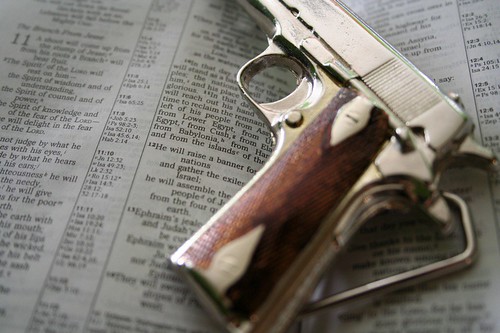
In 2016, 53% of white women voted for Donald Trump. This support was suprising due to his insensitive remarks about women and the Republican Party’s documented opposition to women’s issues, including abortion and paid family leave. In a recent article, Abigail Vegter and Margaret Kelley show how religious beliefs and a fear of “supernatural evil” inform women’s support for another mainstay of the Republican Party: Gun Ownership.
From 2018-2019, the authors conducted 18 months of ethnographic fieldwork in gun ranges in Northwest Kansas. They spoke with 62 shooters and gun owners, the majority of whom were women. They show that fear of a supernatural evil and gun use are linked by a narrative of Christian duty to protect what they see as their vanishing way of life.
The female shooters touched on gendered notions of care and familial protection in justifying their views and actions. Building on the notion of supernatural evil, interviewees revealed a sense of threat from both satanic forces and an overreaching government which, they believe, justifies their self-protection. For these religious women, their religious duty merges with their duty as caretakers and mothers. For instance, Vegter and Kelley show how the belief in a “Satanic force,” including Armageddon, hell, and demons has profoundly personal implications, demanding the protection of their children’s “endangered innocence”.Women gun-users comprise the majority of respondents in the interview sample, authors disproportionately highlight narratives of male shooters in their findings. Intriguingly, they note the difficulty in recruiting male interview respondents, fearing their spouses’ judgement. Even among male shooters, similar motivations are at play when it comes to gun use, including the duty to be diligent against supernatural elements, and to protect their families from shifting cultural values. Citing cultural loss, respondents made clear their resolve to defend their way of life, even if it involved using lethal force. For example, they drew on conservative cultural touchstones from the blockbuster American Sniper to the ongoing debate on religion in classrooms, to argue that they needed guns to protect them in the spiritual battle against cosmic forces. Gun owners saw it as their duty to preserve “good” from creeping “evil.”
Taken together, theological belief and notions of the supernatural still serve as unique indicators of policy choices. The issue of guns and self-protection takes shape in the cognitive and spiritual levels, but closely informs both cultural choices – such as consumption patterns – and political worldviews. According to these shooters, a vanishing way of life and a creeping supernatural evil in their lives required the duty to defend, be diligent, and protect themselves and their loved ones at all costs, including the use of deadly force. Consistent with prior research, respondents preferred less restrictive gun control measures alongside religious freedom policies and government deregulation. With rich interview and ethnographic data, Vegter and Kelley show how the metaphysical and spiritual interact, producing a host of coherent policy preferences.

Comments